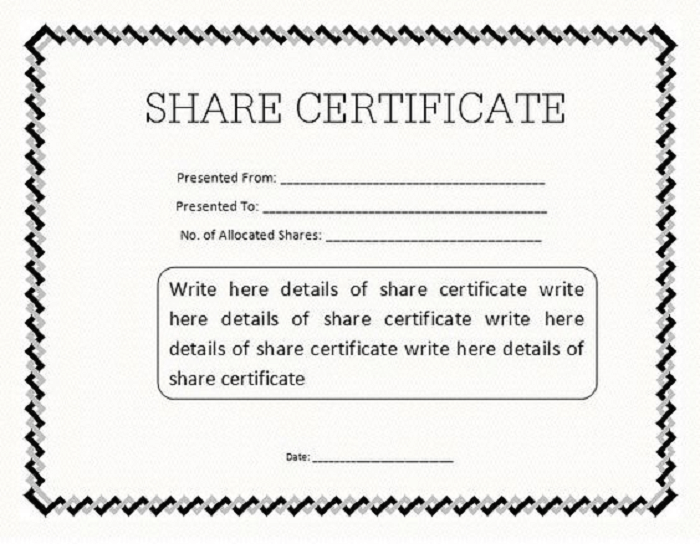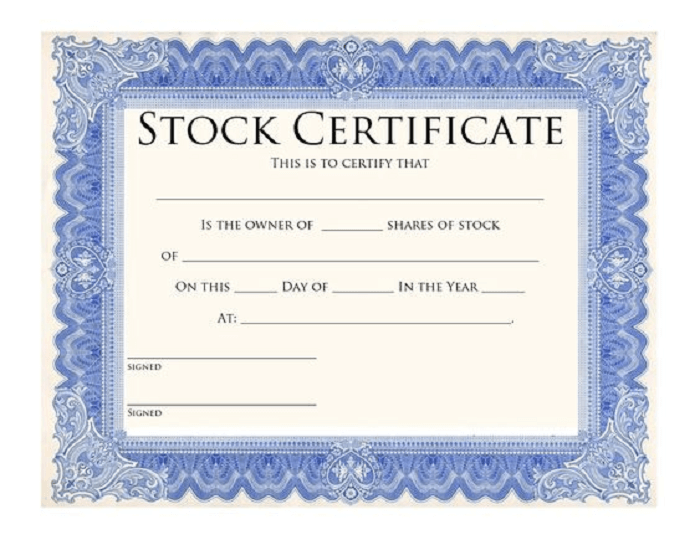Share Certificate: Definition, How They Work, and Key InformationWhat is Share Certificate?A share certificate is a written document signed on behalf of a firm that serves as legal proof of ownership for the number of shares indicated. A stock certificate may also be referred to as a share certificate. 
Key Feature of Share Certificate
Understanding Share CertificateShareholders who buy in are issued a share certificate when companies offer shares on the market. The share certificate effectively serves as a receipt for the purchase and acceptance of responsibility inside the company. The record attests to enlisted responsibilities beginning on a certain day. Important Information on a Share Certificate Includes
The Organizations Act 2006 stipulates that an organization must provide a share certificate (given) when shares are distributed. The organization must provide a share certificate approximately two months after any shares are issued or transferred. Except in the unlikely event that a shareholder requests several certificates, organizations may only issue one certificate for each share transferred or issued at a given moment. A shareholder with a stock certificate can occasionally designate an intermediary to allow someone else to vote for the shares in question. A shareholder without a share certificate might transfer an intermediary to a third party, allowing them to favor the shares being discussed. The terms of the company's contract and corporate regulations define voting rights. A replacement certificate for the same number of shares may be provided in place of a damaged, lost, or stolen share certificate. Before a replacement may be supplied, the shareholder in such a situation must return the damaged report to the organization. As of the right moment, the shareholder has the choice of receiving either a single certificate or many certificates. Share certificates were often required as proof of eligibility for earnings. The receipt for the profit installment was written on the reverse of each certificate when it was presented. In this way, the archive was linked to every record of profit payments. 
Special ConsiderationIndividual financial backers rarely really acquire possession of their share certificates in today's financial company sectors. The truth is that some countries, like Sweden, have completely stopped issuing share certificates as proof of ownership in an organization and have streamlined the most popular method of enrolling owners through electronic enrolment. The Central Security Depository (CSD) is responsible for keeping shares electronically in the US, whether in a certificated or uncertificated (dematerialized) structure, so that owners may be easily transferred through the exchange of books rather than physical certificates. An enrolled, or conveyor structure is a possible location for a share certificate. A bearer share certificate, which is currently exceptional, enables the possessor to exercise all legal freedoms relating to the stock. An enlisted share certificate only serves as proof of title ownership. Due to their verified setup, exceptional design, and unpredictability of their concept, many share certificates, especially older and rarer copies, have grown in value. The collection and examination of share certificates and other equivalent financial information are known as "scripophily." Similar to collecting stamps or currency, the value of a share certificate depends on its quality and age. Advantages of Share CertificateConsider a share certificate if you want to earn even more gains (a measure of cash given month to month by an enterprise to its shareholders out of its income). Similar to a share certificate account is a certificate of store account (Cd). In any scenario, a credit group provides the loan rather than a bank. Share certificates are a fantastic way to make money while building your reserve. Even if you aren't able to withdraw your reserve cash without incurring penalties during the period, you'll almost certainly receive a higher rate than with some alternative possibilities. A few other incentives to think about purchasing a share certificate include the following: 
1. Rates for Certificate The annual rate of return depicts the gains or advantages you could receive on a share certificate. For this rate, it is recalled the building period or the frequency with which returns are added to the record. Credit organizations might increase rates annually, quarterly, monthly, or even daily. 2. Return on Investment that is Guaranteed When you purchase a share certificate, you decide on the loan charge, loan term, and store amount. As long as you don't deplete the funds, you can choose to estimate your earnings upon development at the start of your enterprise. 3. Investing in Long and Short Term You may choose from a variety of speculative options with periods as little as six months and as long as 70 months. If you believe the financing expenses will rise, make a limited-time contribution. If you believe rates will decline or stay relatively stable, you can invest money in a long-term share certificate. Keep in mind that the more the rate, the longer the length; hence, the shorter the time, the smaller the earnings. 4. The Initial Deposit is Low A share certificate may have a $100 opening limit, but a currency market account often requires more substantial speculating and doesn't pay. For larger establishments, kind-sized accounts are available and typically receive a more substantial premium. 5. Help from the Government for Protection The majority of share certificates are safeguarded by the Public Credit Association Organization. You may be sure your money is safe since each record is covered by government protection up to $250,000. 6. Improved Return Among the different investment fund products credit organizations offer, share certificates are a safer, higher-yielding option to save money for a specific time. Choose the one that suits you best by assuming that the added advantages outweigh the time commitment. 7. Adaptable Terms As a speculation, you can be certain of a precise return at any given time. It will be possible for you to choose how quickly your account balance will increase, which will make financial planning clearer. 8. Preferred Return Rate Compared to Bank Accounts Since a certificate holder cannot withdraw money as freely as a customer of a traditional investment account, a certificate might occasionally be more important to the financial foundation than a typical investment account. As a result, the borrowing cost of a certificate is sometimes more important than the cost of a conventional investing account. This enables you to maximize the earnings from your business operation. Disadvantages of Share CertificateGiving a share certificate comes with a few responsibilities. The main drawback, in the eyes of the organization, is a matter of time and money. Giving out paper stock certificates is a concentrated effort that reduces significant expenses. Corporations often require a complete team strictly focused on managing the share certificate structure. Maintaining a stock certificate system involves a significant amount of tedious administrative effort. For instance, after the paper certificates are stamped and given to the organization, all exchanges, such as a consolidation or side project, can proceed. Additionally, consistency proves to be far more difficult to fix. Furthermore, it is very difficult to keep track of possession since shareholders may transfer their certificates to another individual without telling the company. Everything comes down to a lot of administrative center labor to assess personalities and authorize property transfer. As a result, the company must continuously monitor the shares. This is frequently carried out using a computer system. Last but not least, the company will have a lot of work to do if a shareholder's paper certificate is lost or stolen. The company must specifically locate the old shares, authenticate ownership, "stop" the old paper certificates, and then issue fresh paper certificates. Tracking, following, and checking trades using paper stocks is extremely difficult. 1. Penalties for Withdrawal If you withdraw money from a share certificate before the stated development date, you will often be penalized. The amount might be a portion of the advantages, such as 90 days of earnings, depending on the record comprehension. 2. Limits on Liquidity Owners of Compact discs do not have the same access to their assets as owners of traditional investment accounts. In the unlikely event that you remove money from a CD before the term is through, you will be held accountable. This punishment might take the form of decreased interest or a concussion. To increase flexibility, a financial supporter can set up a CD stepping stool that consists of CDs with different development dates and durations. If you use a laddering technique, you have more opportunities to retrieve your CD assets at various times. 3. Potential for Expansion The rate of CD sales may be slower than the rate of expansion. If borrowing expenses dominate development, your cash may eventually lose purchasing control. What Is the Value of My Old Offer Authentications?Keep all of your previous offer authentications. In any case, they may merit anything. You can do the following actions to help you determine their value:
What if You Lost Your Share Certificate?Even in the absence of the physical share certificate, you are still the legal owner of the stock and are entitled to all shareholder rights. You should contact the exchange specialist immediately to request a "stop move" if your share certificate is stolen, accidentally destroyed, or lost. This prevents the stock certificate from being transferred to another person. Additionally, your stockbroker may be able to help you with this cycle. In actuality, you'll want to obtain a new substitute certificate. However, it's typical that businesses will first anticipate you to do the following:
Types of Share Certificates1. Certificates with Variable Rate These certificates, also known as knock rate records, allow you to advance to a higher yield than the one you started with. In the case that the credit union raises its certificate rates during your record, you have the option of obtaining a rate increase. The institution has not set the specific rate change and frequency with which you may expand. 2. Certificates For Young People These records apply to those under the age of eighteen. Credit organizations commonly issue adolescent certificates with shorter term lengths and lower least equilibrium metrics than standard certificates. 3. Certificate in Jumbo Size For these documents, a sizable minimum payment that often falls within the enormous range of USD is anticipated. Nevertheless, they frequently cost less to deliver than other certificates. What is the Cost If Stock Authentications are Transferred on Death?The cost ideas are comparable whether someone is transferring a stock endorsement on death or electronic offerings. In other words, you are not in danger of paying fees on the offers you accept when someone passes away. However, if you sell them, you can be liable for the assessments.
Next TopicTrust
|
 For Videos Join Our Youtube Channel: Join Now
For Videos Join Our Youtube Channel: Join Now
Feedback
- Send your Feedback to [email protected]
Help Others, Please Share









